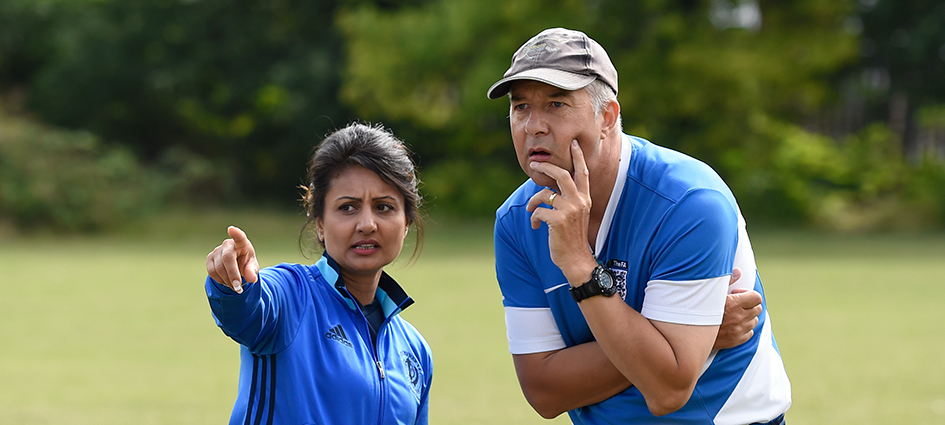Top tips

How to improve your observation skills
- Laura Seth
- 06 March 2019
Laura Seth, FA performance analysis education lead, provides her top tips for improving observation skills at training and on matchday.
Think about your philosophy
Think about what your individual coaching philosophy is or what your club’s playing philosophy is and link your observations to them. So when you’re observing, keep in mind how you want your team to play when you’ve got the ball, when you’ve not got the ball and what that might look like in different areas of the pitch.
Everyone has their own beliefs and values in terms of how they want their teams to play, or they’re working within a framework within a club, so that’s your starting point.
Define success and failure
You’ve got to take a step back and, prior to the observation, define what success and failure is. For example, a wide player is attacking your full back; do you want your full back to show inside or outside? If he or she is showing the player inside and you want them to show outside, that’s going to flag an area that might help you develop some practices for them. You can then teach them about their angle of approach and their body position to force the player outside.
It’s not easy, you still are caught up in the heat of the game, but if you have a logical framework and process to it – and you’re really clear on what certain things look like – the more it’s going to help you in that more pressurised moment.
Make notes
Don’t discount the reliable, trusted pen and paper for making notes - jot down things that are happening or get someone else to make those notes for you.
We’ve all got the capabilities to capture something, whether that’s through a tablet or a phone, because we generally all have those in our pockets now. Using technology, as well as maximising the resource of people that you’ve got around you, can help you at all levels of the game.
It doesn’t have to be all on you
Keep it simple
It’s a well-known saying but just keep it simple. If you’re observing your own team and what you’re working on, just focus on the two or three key things that you want your team to be able to do to be successful.
If you’re studying the opposition it can be as simple as, how are they scoring goals? How are they conceding goals? How are they creating chances? How are they conceding chances? As opposed to being overawed by trying to take in absolutely everything.
Work as a team
Breaking it down into a more logical or structured approach will massively help what you can do, but so will maximising the fact that it doesn’t have to be all on you.
Our national teams utilise this approach. During half-time there’ll be an individual that’ll be focusing on the team in possession, an individual focusing on the team out of possession and an individual focusing on set pieces. They can then come back in and tell the head coach the two key things that they’ve seen, allowing the head coach to then deliver the messages to the players.
Whether it’s an assistant coach, your substitutes, an injured player or even a parent who can help you, this approach will allow you to better understand and evaluate what you’re observing.

Be aware of emotions
Be aware that there are a lot of things that can affect your interpretations. As human beings we’re incapable of processing large volumes of information – we’re more likely to remember a contentious decision that a referee has given a couple of minutes before half-time, a mistake that led to a goal or a great bit of play that led to a goal.
It’s also really easy to have a distorted view because you’re so heavily involved and invested in the game. It can be challenging to then deliver an effective intervention because of the emotions and your passion for wanting those players to do really well.
As long as the people that you’re working with have a clear instruction of what’s going to help you in that particular moment, then it’s going to be a massive help because you do get caught up in the emotion of the game.
Help the players be the best that they can be
Have a particular focus
Football is such a fluid game. There’s so much going on and there are so many interactions between players, so it’s virtually impossible to take on board everything. That’s why it’s really important that you have a particular focus when observing a game.
To do that, you can break the game down by focusing on a particular theme that you’ve been working on, for example, building the attack. Once you have this theme in mind, focus on how effective your players are in that particular phase of the game as opposed to trying to take in everything that’s going on.
Help the players
I always pose two questions: what information helps you better understand and evaluate your team or individual players? Second to that is, what can help the players? Ultimately we’re in the business as coaches to try to help the players be the best that they can be and to give them the best chance of enjoying the game.
Your training sessions, your practice design and your feedback to that individual should be all around helping them to get better, based on developing their strengths and then helping develop some of their weaknesses so they become a strength.































